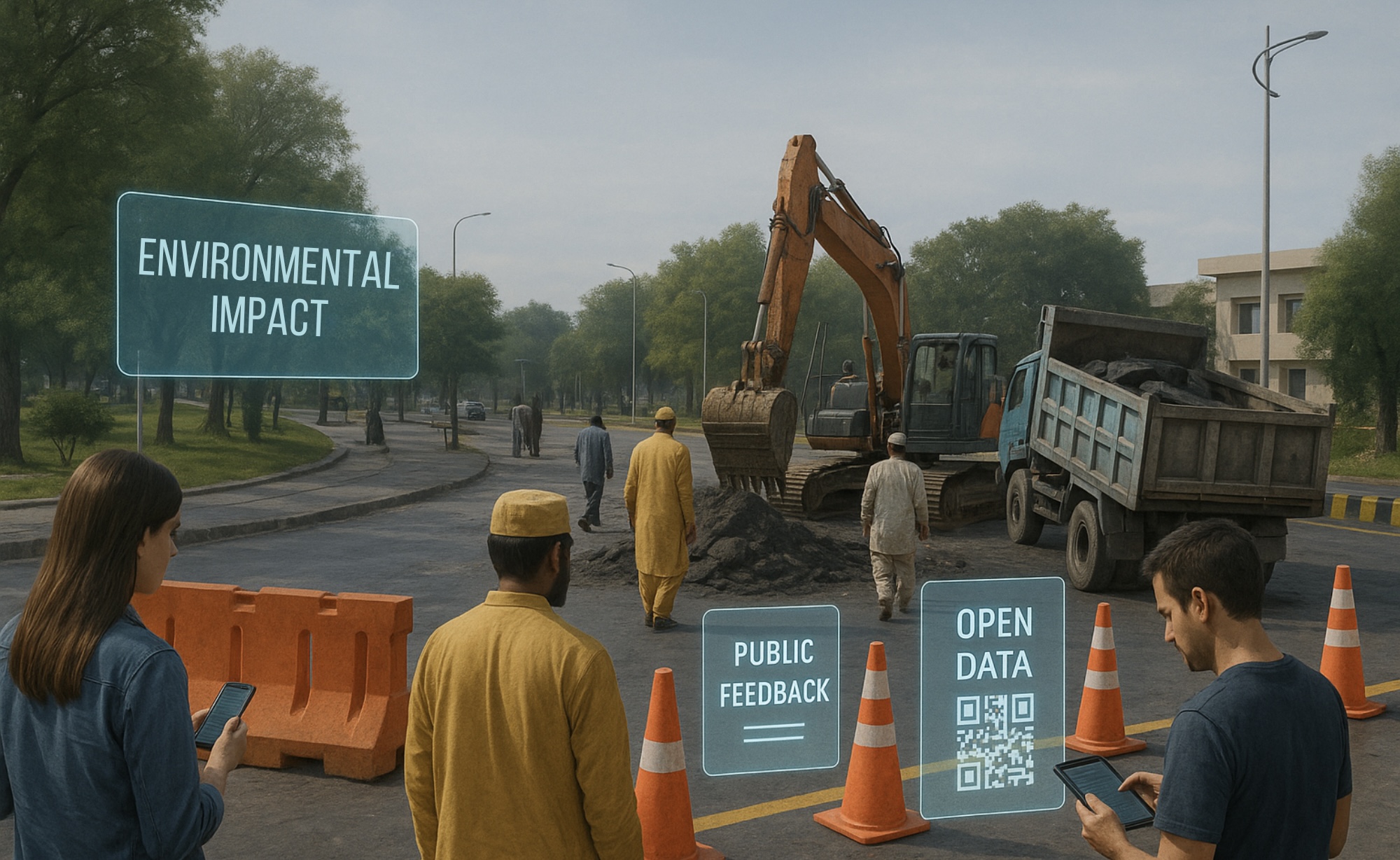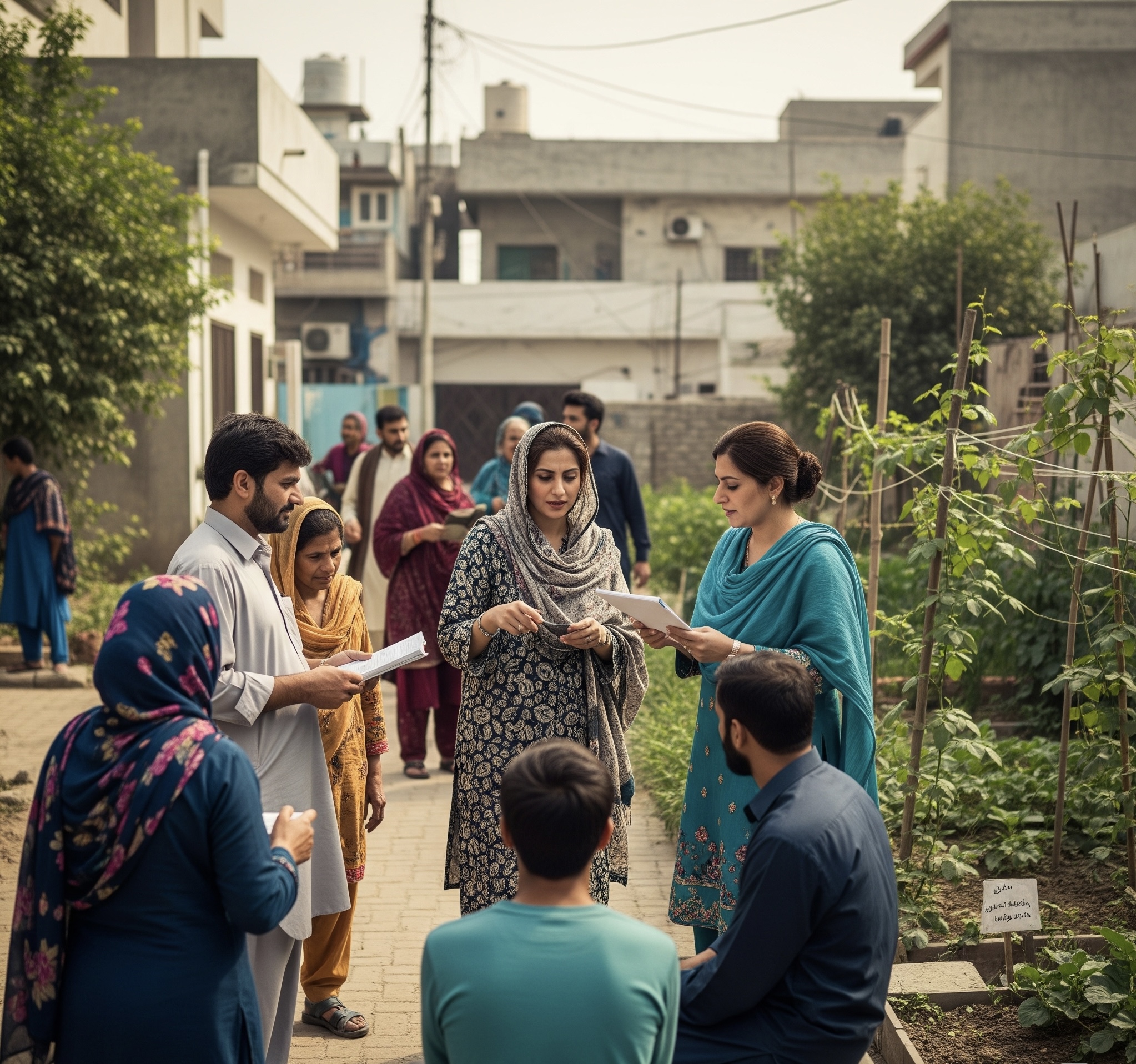NEWS

IN BRIEF

Trust in public institutions isn’t built behind closed doors; it begins with open access to information. This thought piece explores how proactive disclosure and open data can transform governance by making development visible, decisions traceable, and public trust stronger. With relatable local examples, it makes the case for shifting from reactive transparency to a culture where transparency, responsive and inclusive governance is the default, not the exception.
SHARE
Imagine you’re driving through a newly constructed underpass – smooth roads, fresh paint, all signs pointing to progress. Just a few days later, with the first monsoon rain, that same underpass is flooded, damaged, and inaccessible. A similar situation occurred when part of the newly constructed underpass near Serena Hotel in Islamabad sank. What was meant to symbolize urban development had become, overnight, a question mark on public spending and infrastructure quality. As a citizen, you’re left with questions: How could this happen so soon? Was the construction up to standard? Were public funds used transparently? However, when you try to find answers such as project details, costs, timelines, and contractor information, you get limited information, scattered sources, or layers of bureaucracy that make it hard to get the required information, leading to speculation and an increase in mistrust between citizens and state institutions.
This isn’t just about an isolated event; it’s about the gap between the government and the governed, a gap that can be easily bridged through open communication and easy access to information.
The Human Side of Governance
For most of us, governance feels distant. Budgets are numbers we rarely see. Projects are decisions we’re not part of. Accountability is something that happens behind closed doors. But what if that changed? What if government information, specially about development and infrastructure, were not only publicly available but also accessible and easy to understand?
In recent years, Pakistan has taken few significant steps in this direction, especially with the launch of the PSDP Data Portal by the Ministry of Planning, Development & Special Initiatives. The initiative marks a shift in how the state engages with citizens, not just as recipients of services but as stakeholders in national development.
The Public Sector Development Programme (PSDP) is the government’s flagship development portfolio that fuels infrastructure, health, education, and energy projects across the country. For decades, the details of these projects, from budgets to timelines, were not proactively disclosed. That changed in 2023, when PSDP data Portal was launched. This online platform provides real-time access to data on PSDP-funded projects. Citizens can view project titles, locations, approved costs, executing agencies, and even completion status. The portal is more than a digital tool, it reflects a mindset shift, that transparency is not a threat, it’s the foundation of good governance and trust between the government and citizens.
Similarly, Pakistan has taken meaningful steps toward greater transparency through Right to Information (RTI) laws, which allow citizens to formally request data from public institutions. This legal framework reflects the government’s commitment to accountability and citizen engagement. However, in practice, the process can often be lengthy, opaque, and inconsistent. Many citizens face delays, receive incomplete responses, or in some cases, no response at all. For a system meant to empower the public, these gaps can create more frustration than clarity. That’s why proactive disclosure of information, such as real-time publication of project details online, is essential. It reduces the need for formal requests, saves administrative time, and builds a governance culture that is transparent by default, not just by demand.
Why Transparency Matters More Than Ever
Let’s return to the case of the damaged Serena underpass, part of the city’s continuously expanding network to improve traffic flow. According to media reports, a part of the underpass sank and flooded just days after opening, raising concerns about construction quality, drainage design, and oversight.
Now, imagine if, alongside the ribbon-cutting ceremony, the project’s budget, contractor details, feasibility study, and timeline had been made public. Residents could have understood what to expect, held the right institutions accountable, and avoided speculative narratives. Open data can help the government to shift the situation from reactive outrage to proactive engagement and build the citizens’ trust before it breaks down.
From Capital to Community: Taking Open Data Local
Islamabad, as the country’s capital, has always been a testing ground for ambitious infrastructural projects. From signal-free corridors to public parks, every development leaves an imprint on daily life. But what if the city also becomes a model for open governance?
Here’s a simple idea. What if every district administration creates a mini open-data portal, updated regularly with information on all ongoing and upcoming projects?
- What’s being built, where, and why?
- Who got the contract, and through what process?
- How much is being spent, and on what timeline?
- Who to contact for complaints or feedback?
Such a platform doesn’t have to be flashy. Even a basic dashboard, updated monthly, can spark a new relationship between citizens and the district administration. It would empower local journalists, researchers, civil society, and residents to follow the money, without even needing to demand it.
Open Data, Open Conversations
When information is hidden, rumors and misinformation fill the void. But when information is shared freely, speculation has no space to grow. People no longer have to rely on forwarded WhatsApp messages or unverified tweets to understand public spending. They can go directly to the source. Open data also helps government officials. It provides them with a credible platform to showcase progress, explain delays, and solicit public input in a structured manner. It reduces the pressure of defensiveness and opens space for dialogue.
Trust is Built in the Open
In a time when public skepticism is rising globally, the only sustainable currency for governments is trust. And trust is not built through slogans, it’s built through actions that show integrity, inclusion, and openness. Open data is one of the simplest, yet most powerful tools to build that trust. When people see how decisions are made, where money is spent, and who is accountable, they start believing again in the power of institutions.
Initiatives like PSDP portal are the steps in the right direction. But it should be the beginning of a broader movement, one that democratizes data down to the district and neighborhood level. It’s about making governance not only visible but participatory.

Small Steps, Big Impact
Imagine students in Islamabad using local data to build school research projects on urban planning. Or entrepreneurs using open tenders and timelines to plan partnerships. Or residents flagging delays in construction by comparing stated timelines with on-ground realities. All of this is possible, with one small decision to make information public by default, not by exception.
Pakistan’s story doesn’t have to be one of frustration or inefficiency. There are real, positive examples of change, such as the Punjab Portal, Public Procurement Regulatory Authority, and the Pakistan Bureau of Statistics, among others, if replicated at local levels, and coupled with community outreach, user-friendly formats, and regular updates, this model can redefine the relationship between citizens and the state.
Let’s envision a future where open data is the norm, not the novelty. A future where every resident of Islamabad, or any other city, can know, question, and participate in the development process. After all, inclusive governance isn’t about making perfect decisions. It’s about inviting people into the process, trusting them with information, and being open to their voices. That’s how the government can easily turn policies into partnerships and development into shared progress.
Transparency isn’t just good governance. It’s good sense, as well. And in today’s world, it may be the most powerful path to building a government that works, not just for the people, but with the people.
About the Author:
Asif Farooqui is the Director of Programs at the Accountability Lab Pakistan, and can be reached at asif@accountabilitylab.org
